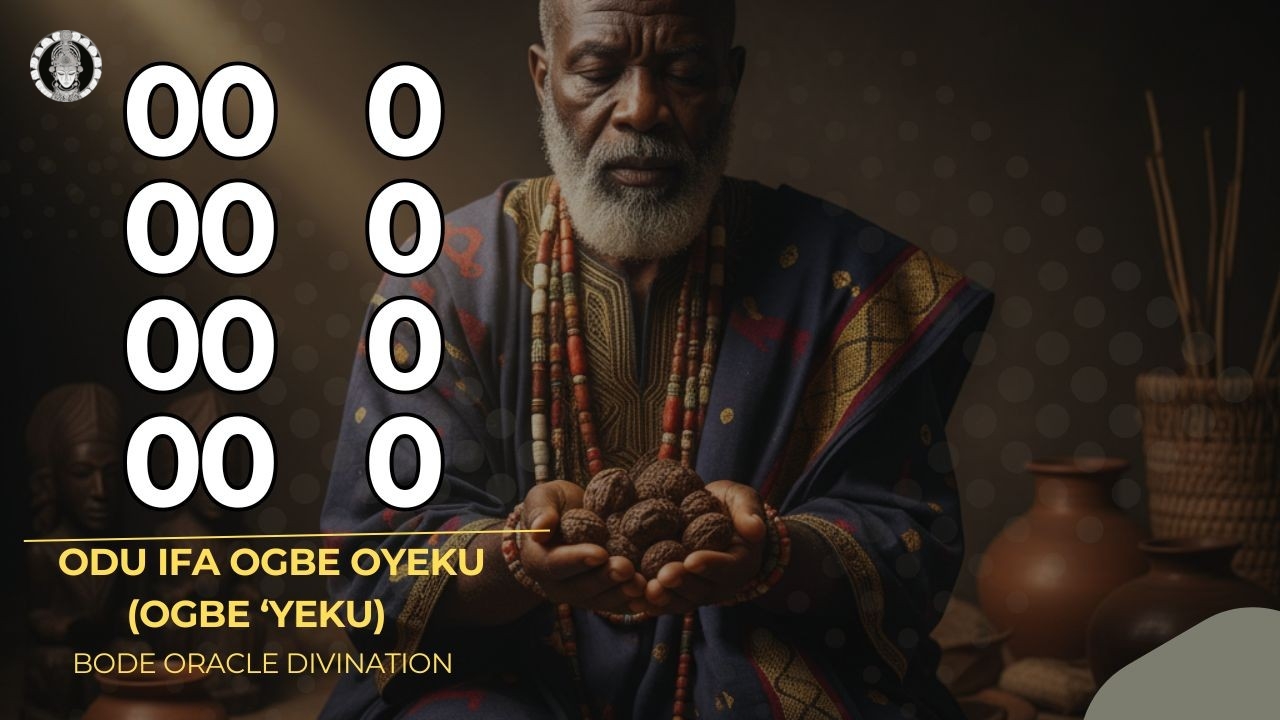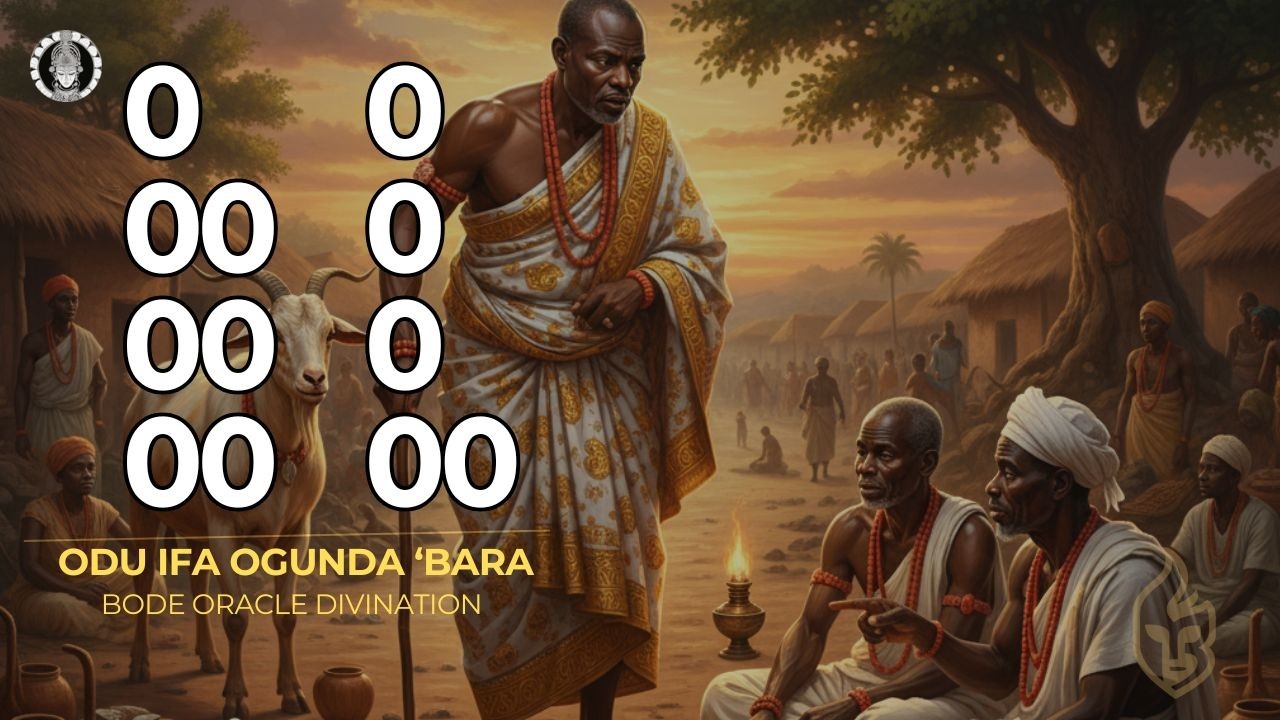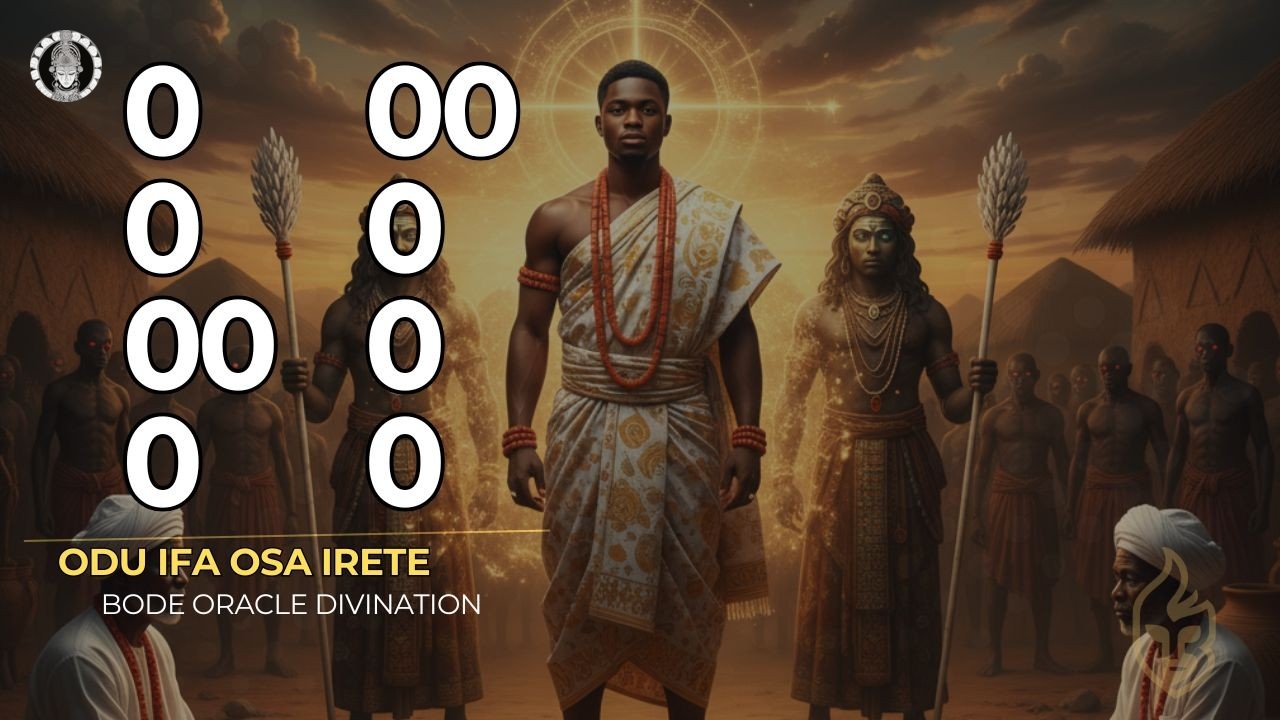Introduction to Odu Ifa Osa Irete (Osa Oloyan)
Odu Ifa Osa Irete, also known as Osa Oloyan, represents one of the 256 sacred divination signs in the Ifa corpus, carrying profound teachings about navigating hostile environments, achieving victory over enemies, recovering lost wealth, and experiencing the gentle return of blessings after periods of difficulty. This powerful Odu combines the transformative energy of Osa with the stabilizing, manifesting force of Irete, creating a spiritual prescription for those who find themselves surrounded by opposition yet destined for triumph.
The divinations within Osa Irete address critical human experiences: being surrounded by enemies who block one's path to success, suffering prolonged hardship that seems unending, losing wealth and prosperity that once was abundant, and navigating dangerous journeys where return with blessings is uncertain. Each story serves as both warning and promise—warning of the real dangers posed by adversaries, and promise that proper spiritual intervention ensures victory, protection, and restoration. For deeper understanding of the Ifa divination system's philosophical foundations, scholarly resources provide valuable context.
What distinguishes Osa Irete is its recurring theme of gentle, smooth manifestation despite surrounding hostility. The phrase "Osa rete, Orin rete, Orinrin rete rete" (walking softly, walking gently for a long time) appears throughout this Odu, teaching spiritual wisdom about patient, careful movement through challenges. This is not aggressive confrontation but strategic navigation—moving with awareness, maintaining composure, and arriving safely at one's destination despite obstacles. The Odu teaches that blessings return "rerere" (gently, smoothly), not through violent upheaval but through steady, certain restoration when proper sacrifice is performed.
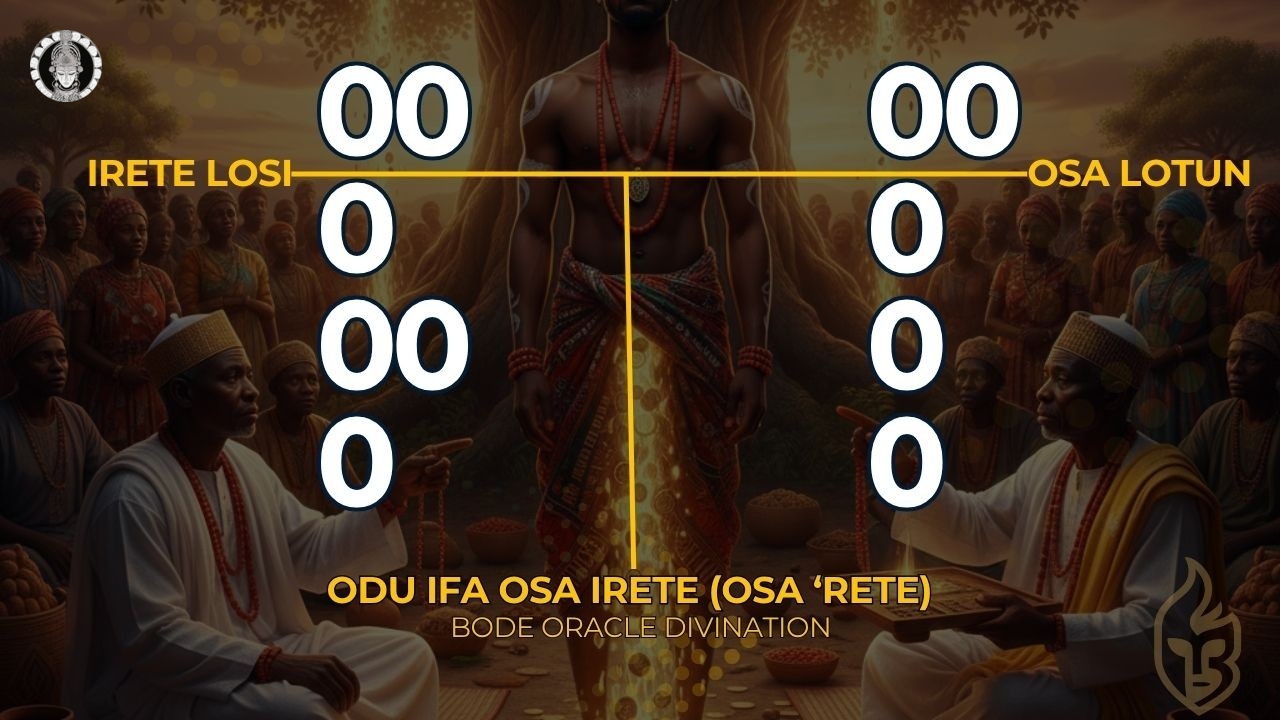
Ifa Divination for Peepeye: Victory While Surrounded by Enemies
The Duck's Journey Through Hostile Waters
This divination from Osa Irete centers on Peepeye (the duck), who found himself in the midst of enemies (laarin ota). The choice of the duck as protagonist carries profound symbolic meaning in Yoruba spiritual thought. Ducks live and move through water—an element that can hide predators, conceal dangers, and present obstacles. Yet the duck navigates these waters with apparent ease, moving smoothly across the surface while paddling vigorously beneath.
This image represents the person receiving this Odu—someone surrounded by hostile forces, operating in an environment where enemies are present and active. The divination promises that just as the duck successfully navigates dangerous waters through proper technique and awareness, the person can achieve safe passage and victorious return through proper sacrifice.
The Journey to Ijebu and Return
The verse specifies that the duck's journey was "to the city of Ijebu." In Yoruba traditional context, Ijebu represents a significant destination requiring travel through potentially dangerous territory. The specific mention of location teaches that this divination addresses actual journeys—physical travel, business ventures, relationship pursuits, or any undertaking that requires leaving one's secure base and returning with desired outcomes.
Ifa reveals that the person is going somewhere and must offer sacrifice to ensure return with goodness (yio ri oore munbo). The warning is explicit: enemies want to obstruct the path to these blessings (ota kiwon oman baada oore re lonan). Without proper spiritual intervention, adversaries will block the successful completion of the journey and prevent the manifestation of blessings.
The Sacred Verse
Osa rete
Orin rete
Orinrin rete rete
Wode Ijebu
Adifa fun peepeye
Tinbe laarin ota
Ebo wonin ose, ogbo ru ru ebo osirubo
Ero Ipo
Ero Ofa
Ebanin laru segun
English Translation
Walking softly,
Walking gently,
Walking gently for a long time
To the city of Ijebu.
Ifa divination was cast for the duck
Who was in the midst of enemies.
He was asked to offer sacrifice,
And he complied.
Pilgrims of Ipo,
Pilgrims of Ofa,
Come and celebrate with me the blessing of victory.
Walking Gently: Strategic Movement Through Opposition
The repeated phrase "Osa rete, Orin rete, Orinrin rete rete" teaches profound wisdom about navigating hostile environments. This is not aggressive confrontation or hasty retreat, but strategic, patient movement. Walking softly means not alerting enemies to one's intentions or movements. Walking gently for a long time represents sustained patience and persistence despite obstacles.
This principle applies to modern challenges: when facing workplace opposition, one moves strategically rather than confrontationally; when dealing with family conflicts, one proceeds carefully rather than rashly; when pursuing business success amid competition, one advances steadily rather than desperately. The gentle approach is not weakness but wisdom—it ensures arrival at the destination intact and victorious.
The Call to Pilgrims: Universal Victory
The verse concludes by calling "pilgrims of Ipo, pilgrims of Ofa" to celebrate victory. This represents the universal application of the blessing—not just for the individual who performed sacrifice, but for all who are on similar journeys (pilgrims). When one person achieves victory over enemies through proper spiritual work, it opens pathways for others facing similar challenges. The victory is both personal and communal.
Prescribed Offerings (Ebo)
For safe journey and victory over enemies, Ifa prescribes palm oil (epo), corn pap (eko), corn (agbado), one turtle (alabaun kan), and money (owo). The turtle is particularly significant—like the duck, the turtle navigates both land and water, carrying its protection wherever it goes. The turtle's shell represents divine protection that accompanies the traveler, ensuring safe passage through hostile territory.
Modern Application: Navigating Opposition
Contemporary practitioners apply this divination to any situation where one must operate amid opposition: business ventures in competitive markets, career advancement despite workplace adversaries, relationship building in hostile family environments, legal proceedings with determined opponents, or spiritual development despite negative influences. The principle remains constant: proper sacrifice combined with strategic, patient action ensures victorious outcome despite surrounding enemies.
Ifa Divination for Baje: Divine Protection Through Orisa Propitiation
The Son of Agbowujin Deity
This divination from Osa Irete introduces Baje, identified as the son of the deity Agbowujin (orisa gba owujin). This designation carries profound meaning—being the "son of a deity" indicates one who has special spiritual heritage, divine protection available through proper propitiation, and the blessing of ancestral spiritual forces. However, even this privileged spiritual position requires activation through sacrifice when enemies surround.
The name "Agbowujin" itself contains spiritual significance: "agbo" (mature, elder), "owu" (cotton, whiteness, purity), "jin" (to dance, to move with power). This suggests a deity associated with mature spiritual power, purity of purpose, and dynamic spiritual movement. As the child of such a force, Baje possesses inherited spiritual authority—but this authority must be properly engaged through offerings to manifest protection.
The Sacred Verse
Oodu gbiri
Ikoko man yin so
Adifa fun baje
Tin somo orisa gba owujin
Igba tin be laarin ota
Ebo wonin ose osirubo
Eropo ero ofa ebanin laru segun
English Translation
Oodu gbiri,
Your pot keeps rolling down.
Ifa divination was cast for Baje,
Being the son of the deity Agbowujin,
When he was in the midst of enemies.
He was asked to offer sacrifice,
And he complied.
Pilgrims of Ipo,
Pilgrims of Ofa,
Come and celebrate with me the blessing of victory.
The Rolling Pot: Instability Without Spiritual Foundation
The opening image of "your pot keeps rolling down" (Ikoko man yin so) carries warning and wisdom. A pot that rolls lacks stability—it cannot hold its contents, fulfill its purpose, or remain where placed. This represents life without proper spiritual foundation: blessings slip away, positions become unstable, relationships lack security, and progress becomes impossible to maintain.
The rolling pot specifically addresses situations where one has spiritual heritage (being son of a deity) but has not activated this protection through proper propitiation. Potential alone is insufficient—spiritual forces require maintenance through offerings, prayers, and honoring. Without this, even those born to spiritual privilege experience instability and vulnerability to enemies.
The Critical Instruction: Feed Your Orisa
The divination's core message is explicit: "kosibo orisa, orisa nin oba segun ota" (feed the deity, the deity is the one who will secure victory over enemies). This teaching establishes that victory over adversaries comes not through personal strength alone but through proper relationship with one's guardian spiritual forces. The orisa fights on behalf of those who properly maintain spiritual relationship through regular offerings.
This principle applies universally: each person has spiritual forces—ancestral, guardian deities, or spiritual protectors—whose support must be secured through appropriate offerings. When enemies surround, the first spiritual action is not aggressive attack but rather strengthening one's spiritual support system by feeding one's orisa. For scholarly understanding of Ifa divination tools and practices, academic resources provide detailed documentation.
Prescribed Offerings (Ebo)
For divine protection and victory, Ifa prescribes two snails (igbin meji) to feed the orisa, liquor (oti), kola nuts (obi), palm oil (epo), corn pap (eko), corn (agbado), and money (owo). The two snails are particularly significant for orisa propitiation—snails represent patience, persistence, and the coolness that calms spiritual heat. Feeding snails to the orisa ensures the deity's calm, steady, certain intervention on behalf of the devotee.
Modern Application: Activating Spiritual Protection
Contemporary practitioners understand this divination as instruction to strengthen relationship with one's spiritual protectors when facing opposition. This might include ancestral veneration, feeding one's head (ori), propitiating one's birth deity, or maintaining altars to spiritual forces. The principle is consistent: when enemies gather, the most effective defense is ensuring one's spiritual support system is properly maintained and activated through appropriate offerings and prayers.
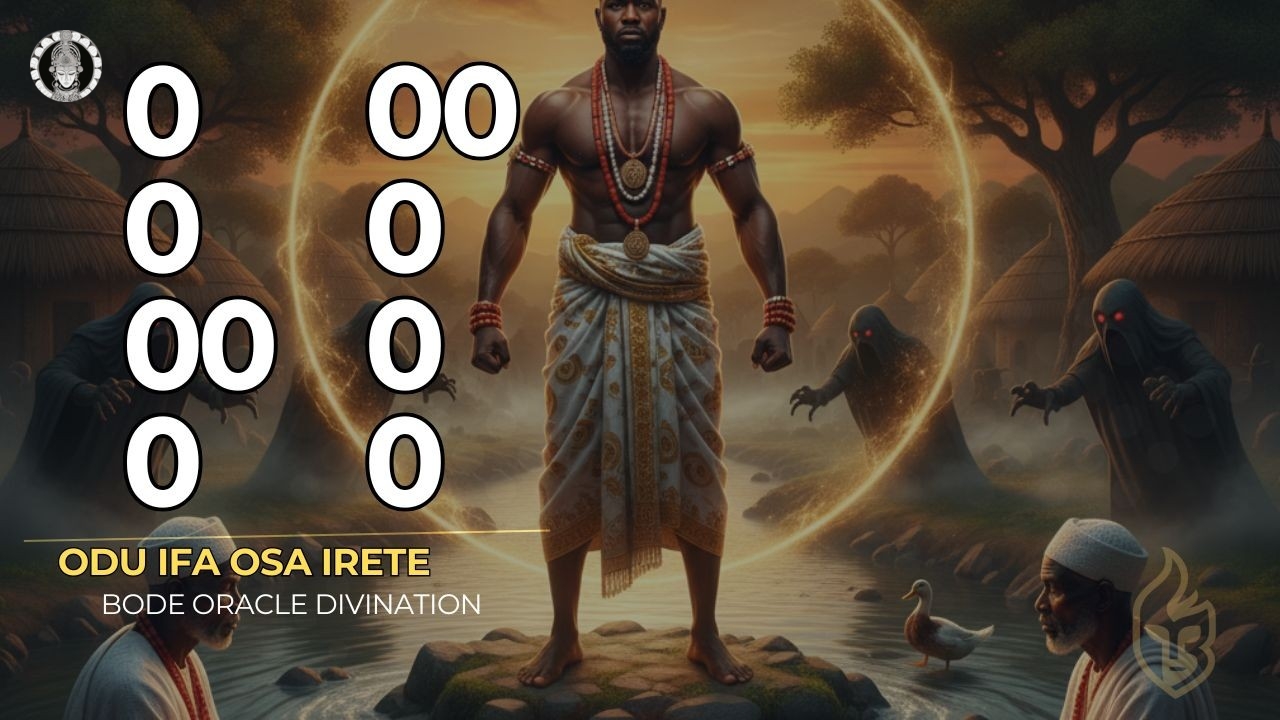
Ifa Divination for Enin Kanjiya: The End of Prolonged Suffering
The Unavoidable Place of Transformation
This divination from Osa Irete addresses one of humanity's most persistent concerns—prolonged suffering that seems to have no end. The opening phrase "Ita Gbangba nin ose kan aasesi" (It is an outdoor place that cannot be avoided) carries profound meaning. There are certain experiences in life—certain passages, certain trials—that cannot be circumvented or escaped. They are the outdoor places we must traverse, the open territories through which our path necessarily leads.
However, Ifa's promise is that while the place cannot be avoided, the outcome can be transformed through proper sacrifice. What would naturally be a place of continued suffering becomes a portal to blessing when spiritual intervention is applied. This teaching distinguishes between the unavoidable nature of certain life experiences and the changeable nature of their outcomes through spiritual work.
The Sacred Verse
Ita Gbangba
Nin ose kan aasesi
Adifa fun omo enin kanjiya
Ebo wonin ose osirubo
Keepe keejinan
Ewa banin bola ba peregede
English Translation
It is an outdoor place
That cannot be avoided.
Ifa divination for the child of Enin Kanjiya,
He was asked to offer sacrifice,
And he complied.
There is no prolonged silence,
Nor too fast,
Nor too soon.
Come and meet me in the blessings of wealth.
The Child of Enin Kanjiya: Identity in Suffering
The protagonist is identified as "omo enin kanjiya" (child of Enin Kanjiya). This naming pattern in Ifa verses often indicates one whose very identity has been shaped by their struggle—the suffering has been so prolonged that it has become part of how they are known. This addresses people who have struggled so long that the struggle itself seems to define them.
Yet Ifa's prescription promises transformation of this identity from "child of suffering" to recipient of wealth and blessings. The sacrifice creates a spiritual break in the pattern of prolonged hardship, allowing a new cycle of blessing to begin. This teaching offers hope to those who feel trapped in endless struggle—there is a spiritual technology available to break the cycle and initiate transformation.
Divine Timing: The End of Suffering and Beginning of Blessing
The divination explicitly states "asiko ire aje eleyi to" (it is time for this person's wealth blessing). This reveals an important principle: suffering has seasons, and so do blessings. There comes an appointed time when one season ends and another begins. However, this transition does not occur automatically—it requires spiritual activation through prescribed sacrifice.
The phrase "keepe keejinan" (no prolonged silence, nor too fast) teaches that when proper sacrifice is performed, the transition from suffering to blessing occurs in perfect divine timing—not delayed indefinitely (which would continue the suffering), nor rushed precipitously (which would create unstable blessings), but manifesting in the appropriate time for sustainable transformation.
Prescribed Offerings (Ebo)
For ending prolonged suffering and beginning prosperity, Ifa prescribes palm oil (epo), corn pap (eko), corn (agbado), money (owo), two kola nuts (obi meji) to propitiate one's destiny, and one rooster (akuko adire kan). The rooster is particularly significant—its crow announces the dawn, the end of night, the beginning of a new day. Offering the rooster symbolizes the announcement that suffering's night has ended and blessing's day has begun.
Modern Application: Breaking Cycles of Hardship
Contemporary practitioners apply this divination to chronic financial struggles, persistent health challenges, ongoing relationship difficulties, career stagnation, or any situation where hardship seems endless. The message is clear: there are spiritual protocols to break cycles of suffering and initiate cycles of blessing. The key is recognizing the appointed time, performing proper sacrifice, and activating the transition through spiritual work. Understanding the broader context of African Traditional Religions and Ifa enhances appreciation for these spiritual technologies.
Ifa Divination for Kin Somo: The Gentle Return of Lost Wealth
The Rich Man's Son Who Lost His Fortune
This divination from Osa Irete presents a poignant scenario: Kin Somo, the son of a once-rich man (soman oloro kan atijo tijo), found himself crying for the blessing of all goodness. The phrase "atijo tijo" (of old, long ago) indicates that the family's wealth is in the past—what once was abundant is now lost. This represents not just poverty but the painful fall from prosperity to lack, the memory of abundance while experiencing scarcity.
This scenario addresses a specific spiritual condition: those who once had blessings but lost them carry a particular kind of suffering. They know what prosperity feels like, making its absence more acutely painful. They carry both the memory of better times and the confusion about what went wrong. Ifa's prescription for such cases offers hope: lost wealth can return, departed blessings can come back, former prosperity can be restored through proper spiritual intervention.
The Sacred Verse
Osa Rete Orin Rete
Adifa fun kin somo
Tii soman oloro kan atijo tijo
Igba tin fomin oju sogbere ire
Ebo wonin ose
O si rubo
Nje ire aje toti
Si lon pada bowa
Rerere esisa un sanbo rerere
English Translation
Walking softly,
Walking gently,
Ifa divination was cast for Kin Somo,
Being the son of an old rich man,
When he was crying for the blessing of all goodness.
He was asked to offer sacrifice,
And he complied.
Therefore, the blessings of wealth that have gone
Are truly returning.
Gently and smoothly the blessings approach my way.
Lost Wealth Returning: The Promise of Restoration
The divination's promise is explicit: "ire aje toti si lon pada bowa" (the blessings of wealth that have gone are truly returning). This teaches that wealth lost is not necessarily wealth lost forever. Through proper sacrifice, departed blessings can be recalled, scattered prosperity can be regathered, and former abundance can be restored. This principle applies to all forms of loss—financial, relational, positional, or spiritual.
The phrase "toti si" (that have truly gone) acknowledges the reality of the loss—this is not about wealth that was never possessed or blessings that were imaginary. The wealth truly departed. Yet Ifa's spiritual technology can reverse this departure, calling back what left, restoring what was lost, and re-establishing what was diminished.
Rerere: The Gentle, Smooth Return of Blessings
The concluding phrase "Rerere esisa un sanbo rerere" (gently and smoothly the blessings approach my way) contains beautiful spiritual wisdom. When blessings return through proper Ifa sacrifice, they come "rerere"—gently, smoothly, peacefully, certainly. This is not violent restoration or unstable recovery but steady, sure, gentle manifestation of returned prosperity.
This teaching addresses anxiety about how blessings will return. People often worry: will restoration come through struggle? Will recovery require fighting? Will wealth return through chaotic means? Ifa answers: no. When proper sacrifice activates spiritual forces, blessings return smoothly, approach gently, and manifest peacefully. The spiritual pathway created by sacrifice ensures that restoration occurs in a manner that is sustainable, stable, and spiritually sound.
Prescribed Offerings (Ebo)
For the return of lost wealth and restoration of prosperity, Ifa prescribes palm oil (epo), corn pap (eko), corn (agbado), and money (owo). The simplicity of the offering reflects the certainty of the outcome—no elaborate sacrifice is required, only proper spiritual activation through these fundamental items that represent sustenance, growth, and material flow.
Modern Application: Recovering Lost Prosperity
Contemporary practitioners apply this divination to business reversals, investment losses, career setbacks, failed ventures, or any situation where prosperity once present has departed. The message is clear: through proper sacrifice, what was lost can return. The key is performing the spiritual work that creates the pathway for gentle, smooth restoration of blessings. For comprehensive understanding of Ifa within Yoruba cultural systems, UNESCO documentation provides valuable insights.
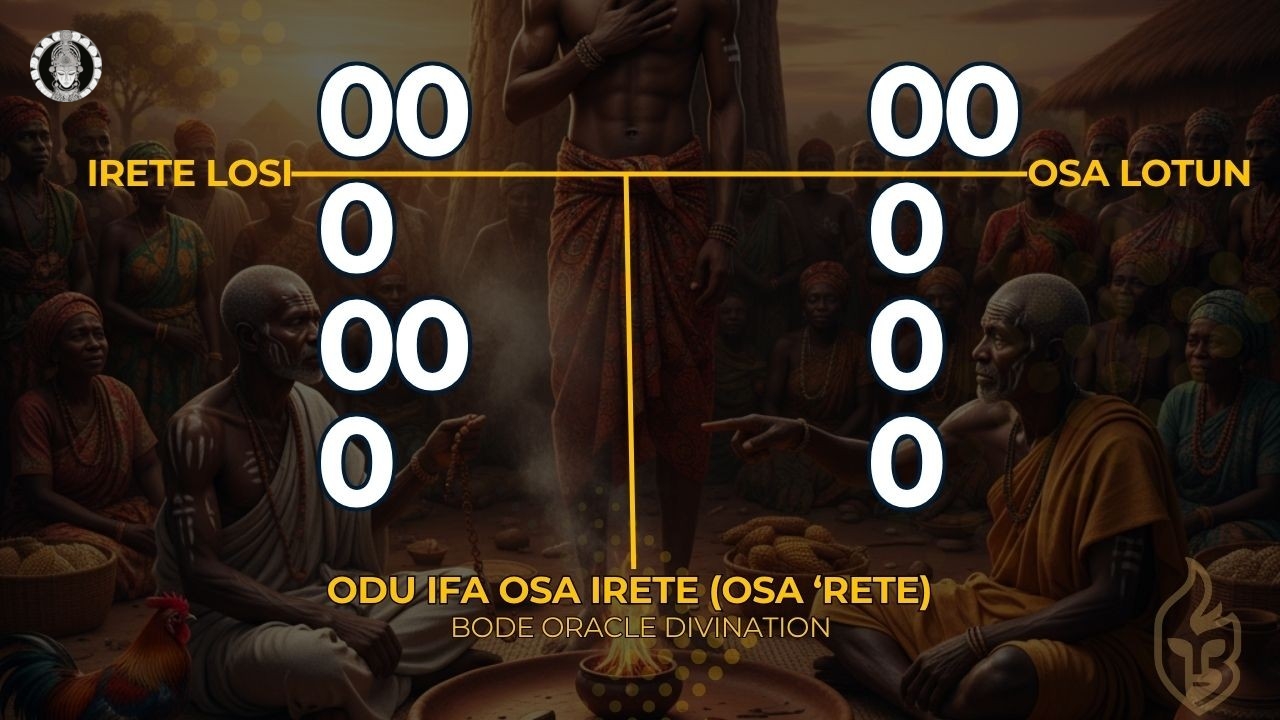
Akose and Spiritual Preparations of Osa Irete
Understanding Akose in Ifa Spiritual Technology
Akose represents sophisticated spiritual technology that combines herbal, animal, and mineral substances with spiritual invocations to produce specific results. Unlike ebo (sacrifices offered to spiritual forces), akose are preparations that practitioners use directly on or in their bodies. The akose of Osa Irete are particularly powerful for attracting blessings (awure) and securing victory over enemies (isegun), reflecting the Odu's dual themes of prosperity and triumph over opposition.
Akose Awure: Preparation for Attracting Blessings
This akose is specifically formulated to draw blessings, prosperity, and good fortune into one's life. It represents the gentle, smooth manifestation of blessings that Osa Irete promises—not through aggressive pursuit but through spiritual magnetism that attracts goodness naturally and certainly.
Ingredients and Preparation Method
The akose requires aje herbs (ewe aje), omo nin gede gede herbs, abundant Oya feathers (opolopo irun oya), honeycomb (afara oyin), and one complete alligator pepper (odidi atare kan). These ingredients are burned together until they become ash, then the ash is mixed with honey (oyin) and consumed.
Spiritual Significance of Ingredients
Aje herbs directly invoke wealth and prosperity—aje being the Yoruba term for both witch and wealth, acknowledging the spiritual power required to accumulate and maintain prosperity. Omo nin gede gede herbs represent multiplication and abundance. Oya feathers bring the transformative power of wind and change—Oya being the deity of winds, transformation, and market commerce. Honeycomb represents sweetness that attracts blessings naturally, while alligator pepper provides spiritual potency and activation.
Method of Use
The preparation is consumed with honey, creating a spiritually charged substance that works from within to align one's spiritual frequency with prosperity. The honey serves both as carrier and amplifier—sweetness attracting sweetness, abundance drawing abundance. Regular consumption builds cumulative effect, gradually transforming one's spiritual signature to naturally attract blessings.
Akose Isegun: Preparation for Victory Over Enemies
This akose addresses the other major theme of Osa Irete—achieving victory while surrounded by enemies. It represents aggressive spiritual power that ensures dominance over adversaries, protection from attacks, and triumph in conflicts.
Ingredients and Preparation Method
The akose combines sereyo herbs (ewe sereyo), rooster head (ori akuko), and cobra snake head (ori sebe). These ingredients are ground together into powder. Nine incisions (monkanla) are made on the crown of the head (sori), and the powder is applied. The remaining powder is consumed with cold corn pap (eko tutu).
Spiritual Properties of Components
Sereyo herbs provide spiritual sight and awareness—the ability to perceive enemies' plans and intentions before they manifest. The rooster head represents vigilance, early warning, and aggressive defense—roosters attack threats to their territory without hesitation. The cobra snake head brings deadly precision, striking power, and the ability to neutralize enemies completely. Together, these create comprehensive victory preparation.
Application Through Crown Incisions
Making nine incisions on the crown (top of the head) is spiritually strategic. The crown represents one's highest spiritual center, connection to divine forces, and seat of consciousness. Placing victory preparation there ensures that one's thoughts, plans, and actions carry the power to overcome enemies. The number nine represents completion and fullness in Yoruba numerology, ensuring comprehensive coverage.
Internal Consumption
Consuming the remaining powder with cold eko ensures that victory power works both externally (through the crown incisions affecting thoughts and actions) and internally (through consumption affecting one's essence and spiritual core). The cold eko provides cooling balance, preventing the aggressive spiritual power from creating internal spiritual heat that could harm the practitioner.
Important Considerations for Akose Use
Both akose preparations should only be prepared and applied under the guidance of a qualified Babalawo who can properly invoke the necessary incantations (ofo ase) and ensure correct spiritual activation. The physical ingredients alone are insufficient—spiritual efficacy comes from combining proper materials with appropriate prayers, invocations, and spiritual knowledge. Additionally, akose work best when combined with proper ebo (sacrifice) and righteous conduct, as spiritual preparations enhance existing spiritual alignment rather than creating alignment where none exists.
Additional Resources
Internal Links
- Osa Irete - Related Odu teachings on victory and warfare
- Bode.ng Blog - Extensive collection of Ifa and Yoruba spirituality articles
- Complete Odu Ifa Directory
- Bode Oracle - Access divination services and community resources
External Resources
- African Traditional Religions: Ifa Divination - Duquesne University
- Ifa Divination System - Wikipedia
- UNESCO Recognition of Ifa Divination System
- Ifa of the Yoruba People of Nigeria - UNESCO Archives
- Opon Ifa: The Divination Tray - Wikipedia
- Ifa Divination System - UNESCO Intangible Cultural Heritage
Connect With Us on Social Media
- BODE Oracle on TikTok
- BODE Oracle on YouTube
- BODE Oracle on Facebook
- BODE Oracle on X (Twitter)
- BODE Oracle on Pinterest
Visit Bode.ng to explore more divination teachings, participate in quizzes and polls, and connect with our community of practitioners and learners. Register today to access exclusive content and personalized guidance on your spiritual journey.
Frequently Asked Questions And Answers About Odu Ifa Osa Irete (Osa Oloyan)
Find answers to common questions about this sacred Odu Ifa and its divination teachings
Osa Irete, also known as Osa Oloyan, is one of the 256 sacred Odu (divination signs) in the Ifa corpus. It carries powerful messages about victory over enemies, the return of lost wealth, divine protection in hostile environments, and the restoration of blessings. This Odu teaches that through proper sacrifice and spiritual intervention, one can triumph over adversaries, recover lost prosperity, and experience gentle manifestation of blessings.
The divination for Peepeye (the duck) in Osa Irete specifically addresses being surrounded by enemies. It promises that through proper sacrifice, one can achieve victory (isegun) even while in the midst of hostile forces. The Odu emphasizes that enemies may block one's path to blessings, requiring spiritual intervention to ensure safe passage and triumphant return.
The divination for Kin Somo reveals that blessings of wealth (ire aje) that have departed are returning. Osa Irete promises that through sacrifice, lost prosperity comes back gently and smoothly. The phrase 'rerere esisa un sanbo rerere' (gently and smoothly the blessings approach my way) emphasizes the peaceful, certain restoration of financial blessings.
The duck symbolizes one who must navigate through hostile territory (enemies) while maintaining composure and achieving safe passage. Ducks move through water smoothly despite underlying currents, representing the ability to traverse dangerous situations with grace. The duck's sacrifice in Osa Irete ensures victory over surrounding enemies and safe return with blessings.
The divination for Baje emphasizes feeding one's guardian deity (orisa) when surrounded by enemies. Osa Irete teaches that the deity is the one who secures victory over adversaries. The prescribed offerings include two snails, kola nuts, palm oil, eko, corn, and money, specifically directed to the orisa who protects and grants triumph.
The repeated phrase 'Osa rete, Orin rete, Orinrin rete rete' (walking softly, walking gently for a long time) teaches spiritual wisdom about patient, careful movement through challenges. It represents moving with awareness, avoiding hasty actions that alert enemies, and maintaining steady progress despite obstacles. This gentle approach ensures safe passage and eventual victory.
Akose Awure is a spiritual preparation for attracting blessings and prosperity. It combines aje herbs, omo nin gede gede herbs, abundant Oya feathers, honeycomb, and one complete alligator pepper, burned together and consumed with honey. Each ingredient contributes specific spiritual properties for drawing wealth and fortune into one's life.
Akose Isegun is a victory preparation combining sereyo herbs, rooster head, and cobra snake head, ground into powder. Nine incisions are made on the crown of the head, with the remaining powder consumed with cold eko. This powerful preparation ensures dominance over enemies, strategic thinking (rooster), and deadly precision in overcoming opposition (cobra).
The divination for Enin Kanjiya addresses prolonged suffering and promises its end. Osa Irete teaches that there is an appointed time for suffering to cease and blessing to begin. The phrase 'asiko ire aje eleyi to' (it is time for this person's wealth blessing) indicates divine timing for transition from struggle to prosperity through proper sacrifice.
Common offerings across Osa Irete divinations include palm oil (epo), corn pap (eko), corn (agbado), and money (owo). Specific divinations add turtle, snails, kola nuts, or rooster. These items address both spiritual and practical dimensions - palm oil for smoothing paths, eko for sustenance, corn for growth, and money for facilitating material blessings.
Osa Irete reveals that the person is going somewhere and must offer sacrifice to return with goodness. The Odu warns that enemies may obstruct the path to blessings. Before undertaking significant journeys or ventures, proper sacrifice ensures safe passage, protection from enemies, and return with desired blessings intact.
Explore comprehensive Ifa teachings through:
- Bode.ng Blog - Extensive articles
- Complete Odu Ifa Directory
- Bode.ng - Divination services
- Osa Irete - Related Odu
Connect on social media: TikTok, YouTube, Facebook, X (Twitter), and Pinterest @BODEOracle for regular teachings.
